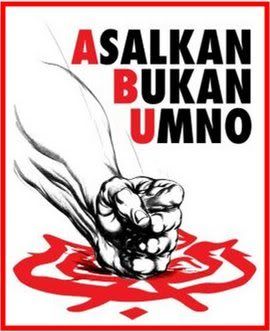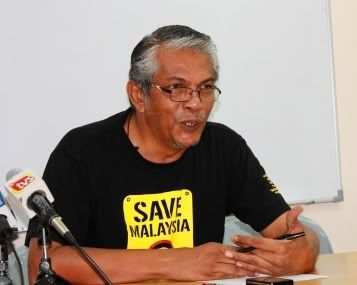Post-901 A.B.U. teeter-totter blues…
Thus far, the transformation that Najib has touted seems to be more rhetoric than reality. In fact, it’s like a game of bait and switch – lure us into believing that his party can transform itself, and then find out UMNO has indeed transformed, but into something uglier and nastier instead. The Najib administration can best be described as one making few steps forward, but several more steps in retreat.
myAsylum
Anyone expecting a lull in the hyperactive Malaysian political scene once 901 was out of the way must be disappointed. In fact, knowing the nature of the beast, the word ‘lull’ doesn’t exist in the Malaysian political vocabulary.
Unless you’ve been living under a rock lately – but not the fake type the MI-6 planted in Russia![]() – you’d probably have come across the acronym A.B.U. at some point.
– you’d probably have come across the acronym A.B.U. at some point.
 It stands for Asal Bukan UMNO or Anything But UMNO, an initiative trying to ensure that come the next General Elections (GE13), the Malaysian people revoke the card blanche given to the party for the last half a century.
It stands for Asal Bukan UMNO or Anything But UMNO, an initiative trying to ensure that come the next General Elections (GE13), the Malaysian people revoke the card blanche given to the party for the last half a century.
Granted, the argument against such kinds of initiatives is usually that UMNO’s rule is by virtue of its cooperation with other component parties within Barisan Nasional (BN), everyone knows who really calls the shots.
As with any initiative that’s political in nature, ABU has its supporters and detractors. It wouldn’t be Malaysia if that weren’t the case.
But before he states his stand on A.B.U., Walski would like to share a back-and-forth exchange between two prominent personalities, both of whom he knows personally…
(ABU this, ABU that, and what Walski’s own stand is, in the full post)
The two personalities Walski refers to are Anas Zubedy![]() and Haris Ibrahim
and Haris Ibrahim![]() . This past week, there was an exchange between the two gentlemen about A.B.U., with Anas stating why he did not agree with it, and Haris explaining why the initiative was important.
. This past week, there was an exchange between the two gentlemen about A.B.U., with Anas stating why he did not agree with it, and Haris explaining why the initiative was important.
You can find the exchange in the following (in chronological order):
- Why I disagree with ABU
 (via Free Malaysia Today
(via Free Malaysia Today )
) - Why I disagree with Anas Zubedy
 (via The People’s Parliament
(via The People’s Parliament )
) - A note to Haris Ibrahim
 (via Free Malaysia Today)
(via Free Malaysia Today) - Dear Anas
 (via The People’s Parliament)
(via The People’s Parliament)
First off, allow Walski to express his opinion that the above is the way to have a disagreement on something. Articulately, without going into ad hominem rhetoric, something that’s unfortunately all too typical of a lot of ‘Net discourse these days.
 In summary, Anas’ initial points were that he disagreed with the assumption that everyone in UMNO is bad, and the notion of the need to get rid of UMNO wholesale.
In summary, Anas’ initial points were that he disagreed with the assumption that everyone in UMNO is bad, and the notion of the need to get rid of UMNO wholesale.
Anas’ standpoint is that a representative should be voted based on the individual’s merit and not based on his or her party affiliation.
Much has been commented about why Anas is taking this stand, including insinuations that his main reason is to protect his rice bowl.
Walski won’t comment on what these commenters think, as the criticism seems to be based more on their suspicion about Anas’ motives. The Anas Walski knows is a centrist, who always prefers the middle ground, a stand he tries to articulate with his opposition to A.B.U..
 On the other hand, Haris Ibrahim is of the opinion that UMNO has been given too much leeway, and in the process has used their position in power to their own benefit. More specifically, to the benefit of the elite within the party, not necessarily the general membership Melayu types.
On the other hand, Haris Ibrahim is of the opinion that UMNO has been given too much leeway, and in the process has used their position in power to their own benefit. More specifically, to the benefit of the elite within the party, not necessarily the general membership Melayu types.
And while Haris doesn’t exactly say outright that all and sundry within UMNO are bad people, he does make a valid point in stating that the inaction and silence of the “good people” against the actions of their party that can and have been construed as being less than savory puts them in a position of collusion. A case in point, the Peaceful Assembly Bill.
Haris has been consistent in his stand on numerous issues over the years that Walski’s known him, and his stand on why ABU is an important initiative doesn’t surprise Walski one iota.
So, you’re probably wondering right about now where Walski stands in all this. Before he clears that question up, allow him to share something that writer (and Walski’s Facebook friend) Kee Thuan Chye wrote, which was subsequently published by Free Malaysia Today.
Umno is beyond redemption. At its general assembly in December, the message it sent out was suspicion of others and hatred for them, and a desperate desire to win the next general election.
Its president, Najib Tun Razak, once again proved what many of us have long suspected – that he is a dissembler. He exposed the ultimate lie behind his 1Malaysia slogan by saying things that would divide the races rather than bring them together. He set the trend for delegates at the assembly to harp on the threats to Umno from other races. It was disgraceful coming from the prime minister of the country. It was supremely irresponsible.
Worse, two days after the assembly ended, he appealed to the right-wing NGO Pertubuhan Kebajikan dan Dakwah Islamiah Malaysia (Pekida) for support. This has to be the final nail in the 1Malaysia coffin.
To cap it all, Umno showed its partiality to cronyism by defending Wanita leader Shahrizat Abdul Jalil over the scandal surrounding her family’s business, the National Feedlot Corporation. One or two colleagues called for her to step down, but the overwhelming majority stood by her and castigated the opposition for exposing the scandal.
This begs the question: Can Umno change? As the major party in the Barisan Nasional (BN) government, can it truly stand up for other races as well, and work for their well-being? Can it stay clear of corrupt practices? Can it stop dishing out favours and projects to party leaders and their cronies? Can it save Malaysia from financial meltdown or will it rather bleed our coffers dry?
(source: Free Malaysia Today)
Read the rest of the essay. It articulates quite closely why Walski supports ABU.
Can UMNO change? And if it can, what will it transform into?
Thus far, the transformation that Najib has touted seems to be more rhetoric than reality. In fact, it’s like a game of bait and switch – lure us into believing that his party can transform itself, and then find out UMNO has indeed transformed, but into something uglier and nastier instead. The Najib administration can best be described as one making few steps forward, but several more steps in retreat.
When the 901 verdict was announced, Najib was quick to proclaim that the verdict cleared BN (read: UMNO/BN) of any conspiracy claims.
Datuk Seri Najib Razak has called rival Datuk Seri Anwar Ibrahim’s acquittal over a sodomy charge today an exoneration for the political conspiracy claims hurled at the Barisan Nasional government.
“Today’s verdict shows once again that, despite what many have claimed, the Malaysian judiciary is an independent institution where neither politics nor politicians have any influence over the dispensation of justice,” the prime minister was quoted as saying by Bernama Online today.
The prime minister added the ruling in favour of the opposition leader was testimony of his administration’s adherence to the tenet of separation of powers.
(source: The Malaysian Insider)
A wiser politician would have taken this small “victory” and move on to bigger and better reforms, as promised. Regardless of how his own party felt.
True, the prosecution has the right of appeal, a right which was exercised at literally the eleventh hour. It’s the timing that raises questions, as does the filing of another acquittal appeal![]() (via The Malaysian Insider), involving another prominent opposition figure, Karpal Singh. Both appeals were filed on the same day.
(via The Malaysian Insider), involving another prominent opposition figure, Karpal Singh. Both appeals were filed on the same day.
 Personally, Walski does think the speculation that Najib has relented to the wishes of UMNO
Personally, Walski does think the speculation that Najib has relented to the wishes of UMNO![]() (via The Malaysian Insider) has merit. He bases this on what’s been ‘said’ by UMNO’s voice on the Internet, the legion of Unit Media Baru
(via The Malaysian Insider) has merit. He bases this on what’s been ‘said’ by UMNO’s voice on the Internet, the legion of Unit Media Baru![]() (or UMB, UMNO’s ‘Net warrior division, so to speak). The tone exhibited since even before the trial began in February 2010 indicates that the UMB were promoting the idea that Anwar was guilty, regardless of what evidence would surface.
(or UMB, UMNO’s ‘Net warrior division, so to speak). The tone exhibited since even before the trial began in February 2010 indicates that the UMB were promoting the idea that Anwar was guilty, regardless of what evidence would surface.
And since the UMB is a sanctioned organ of UMNO, it is therefore reasonable to surmise that UMB reflects the party as a whole, and the party wants Anwar Ibrahim out of the nation’s political picture. Similar case with Karpal Singh. The real reason may not be known, but Walski suspects that UMNO is indeed afraid of any strong opposition. And indications are that UMNO’s opposition is indeed gaining traction.

